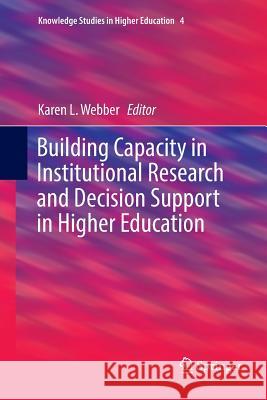Building Capacity in Institutional Research and Decision Support in Higher Education » książka
topmenu
Building Capacity in Institutional Research and Decision Support in Higher Education
ISBN-13: 9783319890425 / Angielski / Miękka / 2019 / 286 str.
Kategorie:
Kategorie BISAC:
Wydawca:
Springer
Seria wydawnicza:
Język:
Angielski
ISBN-13:
9783319890425
Rok wydania:
2019
Wydanie:
Softcover Repri
Ilość stron:
286
Waga:
0.42 kg
Wymiary:
23.39 x 15.6 x 1.6
Oprawa:
Miękka
Wolumenów:
01
Dodatkowe informacje:
Wydanie ilustrowane











